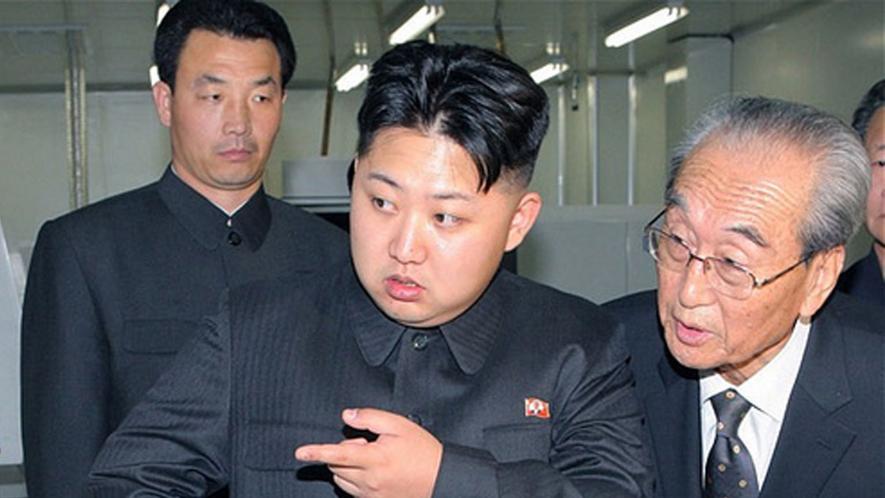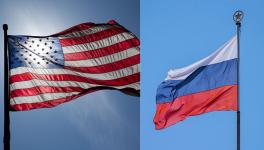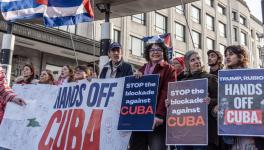North Korea and Yemen — the Costs of Empire

As the war of words between the governments of Donald Trump and Kim Jong Un has spiraled into child-like name calling and escalating military threats, the world shudders at the possible consequences. The Pentagon has reportedly estimated that a North Korean attack with conventional weapons against the South would kill 20,000 people a day; but deaths could reach the millions in the event of a nuclear war.
Meanwhile, in Yemen, the US is already participating militarily in what humanitarian aid groups have labeled crimes against humanity. US military forces are participating in refueling Saudi bombers and also in their targeting, which has killed thousands of civilians. By cutting off food imports, the Saudi-led intervention in Yemen’s civil war has put more than seven million people at the brink of starvation.
The “Saudis are deliberately trying to create a famine inside Yemen in order to essentially starve the Yemenis to the negotiating table” — and “the United States is participating,” said Senator Chris Murphy.
And now, as a result of the destruction, Yemen has the worst cholera outbreak in the world, which has infected more than 500,000 people, with at least 2,000 deaths so far. The UN estimates that a child in Yemen dies every 10 minutes from preventable causes.
When our government threatens whole nations with annihilation, or participates in massive cruelty and collective punishment in far-away places, it is important to at least try to understand why this happens. While these crimes are illegal (even Trump’s threats against North Korea are prohibited by the UN charter) and nothing could justify them, our political leaders and policy analysts nonetheless fill the mass media with rationales that often win at least tacit support from many people who should know better.
The idea that North Korea’s nuclear capacity is a threat to the US, in particular because Kim might be crazy enough to attack us, was dismissed in a recent New York Times report:
The fear is not that Mr. Kim would launch a pre-emptive attack on the West Coast; that would be suicidal, and if the 33-year-old leader has demonstrated anything in his five years in office, he is all about survival. But if Mr. Kim has the potential ability to strike back, it would shape every decision Mr. Trump and his successors will make about defending America’s allies in the region.
In other words, if North Korea could retaliate against a US attack, Washington would have less power in Asia. It seems that when we dig beneath the surface of “national security” arguments for terribly dangerous or violent foreign policies, it is more often power, rather than the security or well-being of Americans, that underlies them. Otherwise, the negotiation of peaceful solutions would be the first priority.
But as recently as June, the Trump administration dismissed an offer from North Korea and China to negotiate a deal in which North Korea would freeze its missile and nuclear testing in return for the US freezing its “big, large-scale military exercises” in the Korean peninsula.
The same imperial priorities that prevent a negotiated solution with North Korea appear to be a major reason for US participation in the war and atrocities in Yemen. In this case it is part of Washington’s strategic alliance with the Saudi dictatorship, which has recently been subjected to increasing criticism for its supportfor terrorist groups, including ISIS.
Fortunately, members of Congress are pushing back against the unconstitutional, unauthorized participation in the Saudi-led war in Yemen.
For nearly three years, the Executive Branch has deployed the US military, at the Saudi dictatorship’s request, against an indigenous Yemeni rebel group called the Houthis. The Houthis are unrelated and opposed to Al Qaeda and ISIS — the groups targeted by the US under the 2001 Authorization for Use of Military Force. A bipartisan group of lawmakers is forcing our country’s first public debate and vote on these unauthorized hostilities by introducing a “privileged” resolution, which means it goes to the floor of Congress over the objections of leadership, to direct President Trump to withdraw US forces from this famine-threatening Saudi war.
But there needs to be more pressure from below. The tens of millions of Americans who already understand the difference between “national security” and empire need to be more active in getting Congress to restrain the Trump administration.
Bernie Sanders recently noted that “Saudi Arabia is not our ally,” and proposed a more “even-handed” approach toward the conflict between Iran and Saudi Arabia. He also opposed the foreign policy goal of “benign global hegemony” that he attributed to “[s]ome in Washington,” and denounced the “organizing framework” of the “Global War on Terror” as a disaster.
This is a good sign, and indicates that the movement that propelled Sanders to win 46 percent of the Democratic presidential vote has the potential of putting forward a more independent foreign policy. The mass support for athletes who are “taking a knee” during the national anthem at sports events is another welcome development that wouldn’t have seemed possible just a few years ago. The athletes’ protest is against racism and police brutality, but at the same time they — and their tens of millions of supporters — have refused to be intimidated by the false and “paid patriotism” promoted by Trump. This, too, has implications for the feasibility of badly needed debates, and independent thinking on US foreign policy.
Trump has contributed to this mass awakening by personally embodying and spewing out so many of the hateful wrongs that need to be righted. No need to thank him for that — he has made the world a more dangerous place -- but we must seize the moment.
Mark Weisbrot is Co-Director of the Center for Economic and Policy Research in Washington, D.C., and the president of Just Foreign Policy. He is also the author of the book “Failed: What the ‘Experts’ Got Wrong About the Global Economy” (2015, Oxford University Press).
Disclaimer: The views expressed here are the author's personal views, and do not necessarily represent the views of Newsclick.
Get the latest reports & analysis with people's perspective on Protests, movements & deep analytical videos, discussions of the current affairs in your Telegram app. Subscribe to NewsClick's Telegram channel & get Real-Time updates on stories, as they get published on our website.























